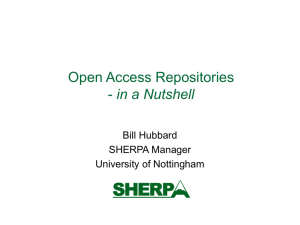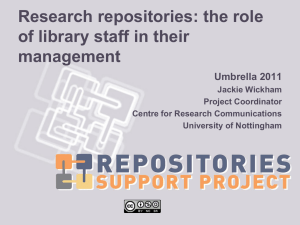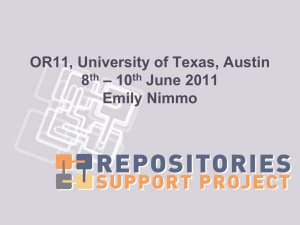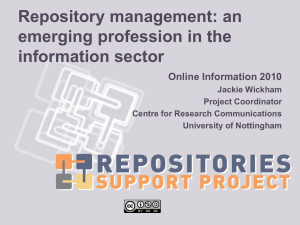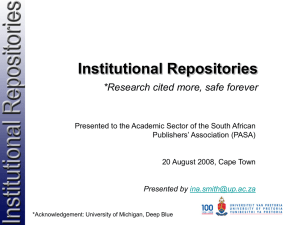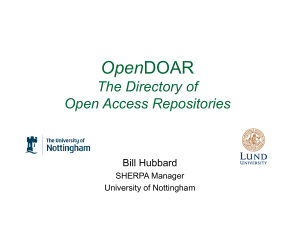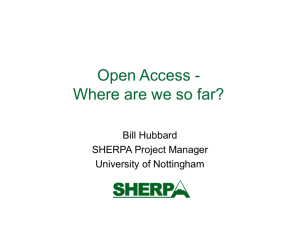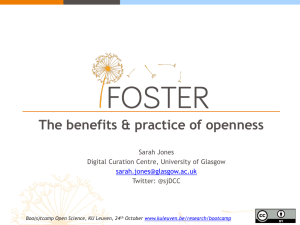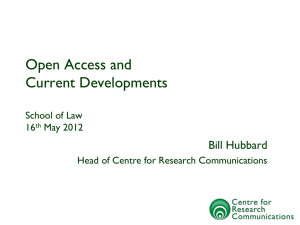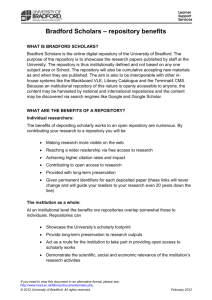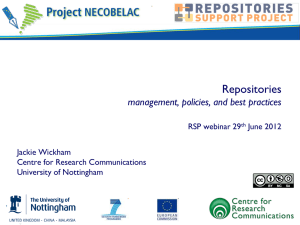Open Access and National Adoption
advertisement
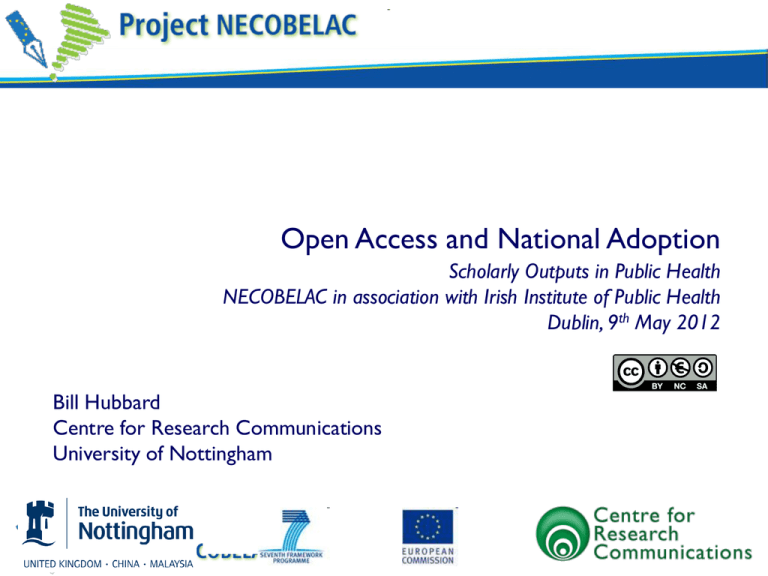
Open Access and National Adoption Scholarly Outputs in Public Health NECOBELAC in association with Irish Institute of Public Health Dublin, 9th May 2012 Bill Hubbard Centre for Research Communications University of Nottingham National adoption • Models from elsewhere • Netherlands – Cream of Science – National coverage • USA – independent • UK – relatively successful UK examples • • • • SHERPA - self-help group SHERPA Plus - self-help and workshop support RSP - centralised support, workshops, consultancy DRIVER - advocacy for IRs, European standards, political confederation • UKCoRR - repository manager peer group and professional body • Now virtual coverage of the UK research base Lessons learnt overview For Open Access to work, need • • • • • Permissive legal situation Technical capabilities & systems Functioning national network of repositories National network of OA activists Buy-in from stakeholders on OA Legal Environment • Permission to archive – work with publishers and advisory services • Direction to archive – work with funders, institutions and governments • Stakeholders - particularly authors - need clarity, reassurance and service-level assistance Technical capabilities • Not a technical problem - within current capabilities • To put together a repository, need a techie with web service and LAMP stack skills - or buy it in! Functioning network of repositories National network of OA activists • Identify agents of change • Identify early adopters, local champions – critically analyse any record of success • Support them with information and links • Help them identify local quick wins and political targets • Give them advice and information about benefits and cost/benefit cases Provide training and support • Materials are available – See NECOBELAC, SHERPA, RSP websites • Services are available – See RoMEO, JULIET, DRIVER • Recognise that peer-to-peer support has value: OA is an intensively collaborative exercise Create peer-to-peer and self-help groups • • • • Example of SHERPA Example of UKCoRR Example of DRIVER What examples exist within Irish healthcare for other change initiatives? Top-down support - Funding Bodies • Recognition of value of OA to mission of funders • Policies/ mandates to ensure OA and/or deposition • Recognition/reward of compliance from authors – and sanctions for non-compliance from authors – work with repository managers • Promotion of OA work to their stakeholders (government, general public, researchers, institutions, learned societies) Side-to-side support • Networking amongst peers – email, events, wikis, blogs • Professional training – advocacy, technical issues, legal issues • Share best practice, standards • Self-help - create: – mentoring arrangements – peer-networks – professional support groups - eg, UKCoRR Bottom-up support - local activists • • • • • Support repositories Create effective policies for/about repository use Advocacy to researchers, authors and library staff Tackle practical problems Identifying work-flows and structures within institutions to support OA deposit • Act as institutional focus to drive repository agenda Buy-in from stakeholders on OA Who are the stakeholders? • Academic authors • Academic researchers • Medical practitioners, patients, learned societies, general public • Librarians and information professionals • Senior institutional administrators • Funding agencies • Publishers First - general stakeholder awareness • Available materials for all stakeholders showing: • Idea and advantages of Open Access to research • Different forms of Open Access – repositories, publishing • Different uses of Open Access repositories and publishing systems • Support material for FAQs and initial concerns and initial enthusiasms Achieve buy in from stakeholders • • • • Demonstrate benefits Integrate with existing workflows Integrate with existing structures Analyse incentives for each stakeholder group and answer • Identify structural blocks to OA adoption • Recognise vested interests and respond Questions? • Bill Hubbard • Head of Centre for Research Communications • bill.hubbard@nottingham.ac.uk
